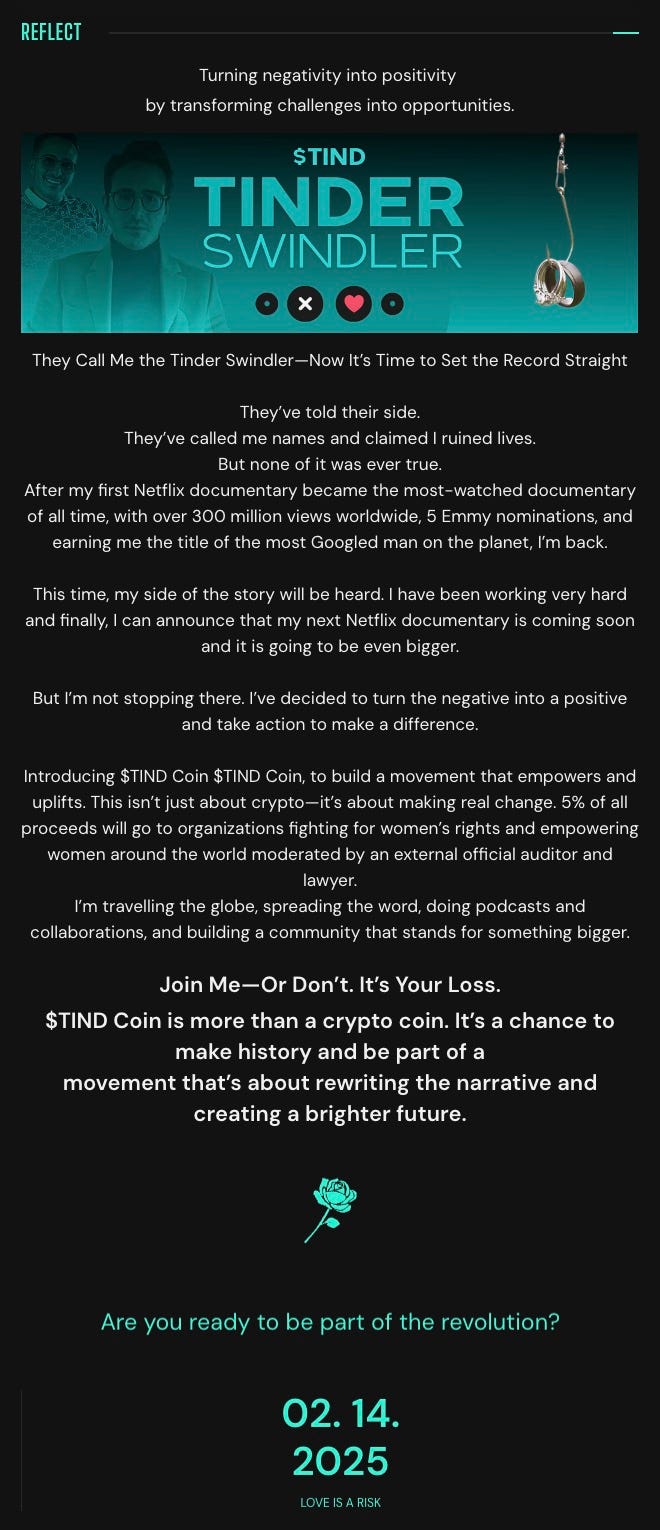Scamurai Weekly: The Tinder Swindler’s Failed Memecoin Launch
The token was originally set to launch on Valentine’s Day but was a bit of a disaster.
Hi folks,
Welcome to another edition of stupid stuff in the memecoin space. Below, you’ll find links to pieces on Libra, Meteora and Huione.
But first, let’s talk about the Tinder Swindler and his tragic, failed attempt at launching a memetoken.
I debated whether to even write about this—I didn’t want to give it any attention because, well, that’s exactly what they want. But the journalist in me just can’t seem to keep quiet when I should. So, let’s dive in.
Back in 2022, Netflix released The Tinder Swindler, a true crime documentary about Simon Leviev (real name Shimon Hayut), an Israeli con artist who used Tinder to lure women into romance scams, defrauding them of millions.
The film follows three of his victims—Cecilie Fjellhøy, Pernilla Sjöholm, and Ayleen Charlotte—who expose how Leviev posed as the wealthy son of a diamond tycoon, wooing women with extravagant dates, private jet trips, and luxury hotels.
Once he gained their trust, he staged elaborate crises, claiming he was being hunted by “enemies” and that his banks accounts were frozen. He convinced his victims to send him large sums of money, which he then used to fund his lifestyle and bait new targets.
His scam worked by essentially robbing one victim and using the money to impress the next. Many women were left in financial ruin, drowning in debt while he continued his con across Europe.
Eventually, his victims teamed up with journalists, leading to an exposé by Norwegian news outlet VG. The latest in a string of legal issues, Leviev was arrested in 2019 but sentenced to just 15 months in Israel for identity fraud unrelated to his romance scams. He was released after only five months.
Since then, he has attempted to rebrand himself and even dabbled in launching an NFT collection.
This past weekend, Leviev attempted to launch a memetoken called $TIND.
I’ll go through the marketing materials here and try very hard not to comment. Hopefully, they speak for themselves.
Everything about the token seems intended to drum up attention by causing outrage. It was originally set to launch on Valentine’s Day (though it was delayed).
Leviev tried to leverage his notoriety, bizarrely referring to The Tinder Swindler as “my documentary” and boasting about its five Emmy wins.
The project's website insisted that $TIND was part of a movement, an opportunity to rewrite the narrative and make real change. Supposedly, 5% of the token supply would go to charities supporting women’s empowerment.
He also claimed to be working on an upcoming Netflix documentary—this time telling his side—which would be even bigger. Netflix did not respond to a query asking if they were working on a project with Leviev.
The launch was delayed, and when it finally went live, it flopped. Prior to the contract address being made public in the Telegram group, several wallets began buying into the token in the minutes leading up to the launch. That’s despite assurances from mods that there was no “insider group”.
The Telegram group boasted over 75,000 members, but there are currently only about 2,300 holders—down from a peak of 2,797. Those who did buy in are, unsurprisingly, unhappy. But any critical comments in the Telegram chat are swiftly deleted under the guise of “protecting against FUD.”
It’s current value is down 92% from $0.020414 at launch to $0.001601.
Meanwhile, Leviev has now set his Instagram to private. He did not respond to two interview requests made via Instagram.
Elsewhere
Meteora — Company faces insider trading allegations as CEO Ben Chow resigns. The Defiant
Libra — How retail got burned while insiders profited. Bloomberg
Dave Portnoy — The Barstool Sports founder launches another memecoin. Decrypt
How I Almost Got Slaughtered in a Pig Butchering Crypto Scam – How scammers manipulate victims into fake crypto investments. Unchained Crypto
Hong Kong Crime Stats 2024 – Scams were the city's most reported crime last year, averaging 122 cases per day. HK Police
How COVID-19 Shaped Scam Trends in Hong Kong – The pandemic fueled the rise of industrialized online scams and deception crimes. Springer
HuiOne and CertiK – CertiK apologises for auditing code linked to a Cambodian firm involved in forced labor. DL News
Housekeeping
Also, I’m looking into cases where people have had money stolen and faced difficulties getting exchanges to cooperate with law enforcement. If you’ve experienced this, I’d love to hear from you.
I’ll be in Bangkok for most of next week if anyone wants to meet up. This week, I’m in Hong Kong if you’re at Consensus. Get in touch at callan@scamurai.io.
Cheers,
Callan






